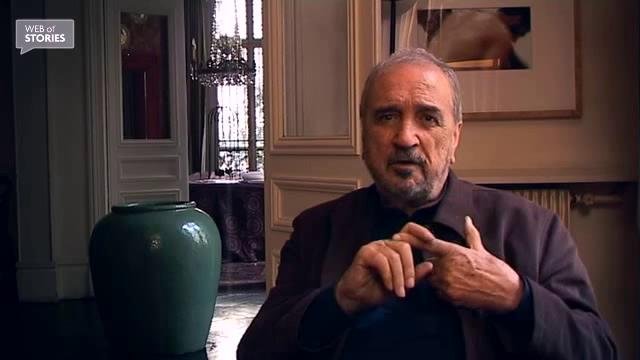NEXT STORY

Quest for the ideal sound effect
RELATED STORIES

NEXT STORY

Quest for the ideal sound effect
RELATED STORIES


|
Views | Duration | |
|---|---|---|---|
| 11. Each country writes history its own way | 2 | 132 | 02:31 |
| 12. Military experience in Algeria | 121 | 01:40 | |
| 13. Algeria’s past | 101 | 01:52 | |
| 14. 'It Was War' | 99 | 01:33 | |
| 15. Working as the colonel’s secretary | 89 | 01:14 | |
| 16. My life inclined towards films | 116 | 03:33 | |
| 17. Jacques Tati picked me | 1 | 177 | 03:39 |
| 18. Observations in the rain | 1 | 152 | 01:06 |
| 19. What I learned from Tati | 2 | 169 | 01:24 |
| 20. Quest for the ideal sound effect | 137 | 02:05 |


J’ai connu Tati pendant très longtemps, je l’ai encore connu quelques mois avant sa mort, même si je n’ai pas travaillé avec lui, j’ai commencé avec Pierre Etaix et nous l’avons, entre guillemet, quitté du point de vie professionnel. Mais Tati m’a appris et pas seulement à moi, à d’autres, il m’a appris à regarder le monde. C’est-à-dire il m’a donné des leçons de regard, l’essentiel de Tati était de s’asseoir à la terrasse d’un café et de regarder autour de nous les gens qui passaient. Tous les détails du monde qui nous sont donnés comme un cadeau, comme… Et de nous demander dans ce que nous voyons quels sont les détails qui pourraient être le début d’une scène dans un film. Dans un film comique, c’est-à-dire comme si Dieu avait créé le monde pour qu’un jour il soit un film de Jacques Tati. Voilà, c’est le seul but de l’existence de ce monde, on s’interroge beaucoup là-dessus. Je peux dire que, en tout cas, que le monde à une raison d’être, c’est d’être un jour un film comique. Et çà c’est une leçon de regard, d’observer… minutieusement, patiemment et à partir de ce qu’on a vu de développer mentalement des scènes qui pourraient exister ça, c’est la grande leçon de Tati. Ça et l’extraordinaire minutie de son travail.
I knew Tati for a long time, I even saw him again a few months before he died, and even if I did not work with him, I started with Pierre Etaix, and then, we started to diverge professionally. But Tati taught me, and not only me but several others, to look at the world. He gave me lessons in truly looking, the essence of Tati was to sit in a café, and look at people going by. All the details in the world are then given away, as if... And to ask ourselves which of those small details could be the start of a film scene. In a comedy it is as if God had created the world just so that one day it could be in a film by Tati. There it is – the only reason why the world exists, and people keep wondering about it. I, for one in any case, can say that the world has one reason for being, and that is to one day be a comedy. And that’s a lesson in looking and observing... carefully, patiently and to mentally develop scenes from what you could see, that is Tati’s teaching. This and his amazing work on details.
French screenwriter Jean-Claude Carrière (1931-2021) began his association with films aged 24 when he was selected by Jacques Tati to write for him. This early experience led to further contact with other film-makers, including Luis Buñuel with whom Carrière collaborated for many years. He wrote screenplays for films including Belle de Jour, The Discreet Charms of the Bourgeoisie, Tin Drum and Danton.
Title: What I learned from Tati
Listeners: Andrzej Wolski
Film director and documentary maker, Andrzej Wolski has made around 40 films since 1982 for French television, the BBC, TVP and other TV networks. He specializes in portraits and in historical films. Films that he has directed or written the screenplay for include Kultura, which he co-directed with Agnieszka Holland, and KOR which presents the history of the Worker’s Defence Committee as told by its members. Andrzej Wolski has received many awards for his work, including the UNESCO Grand Prix at the Festival du Film d’Art.
Tags: Jacques Tati, Pierre Etaix
Duration: 1 minute, 24 seconds
Date story recorded: January 2010
Date story went live: 26 July 2010